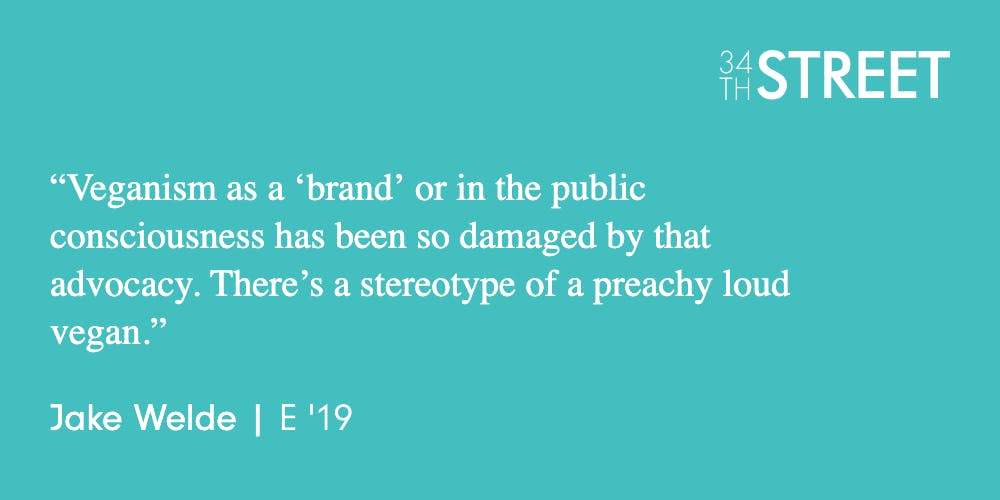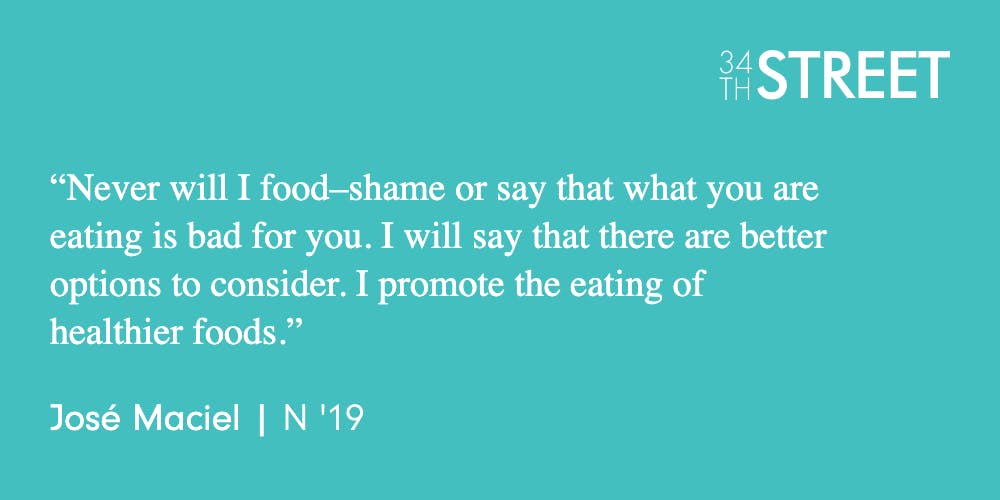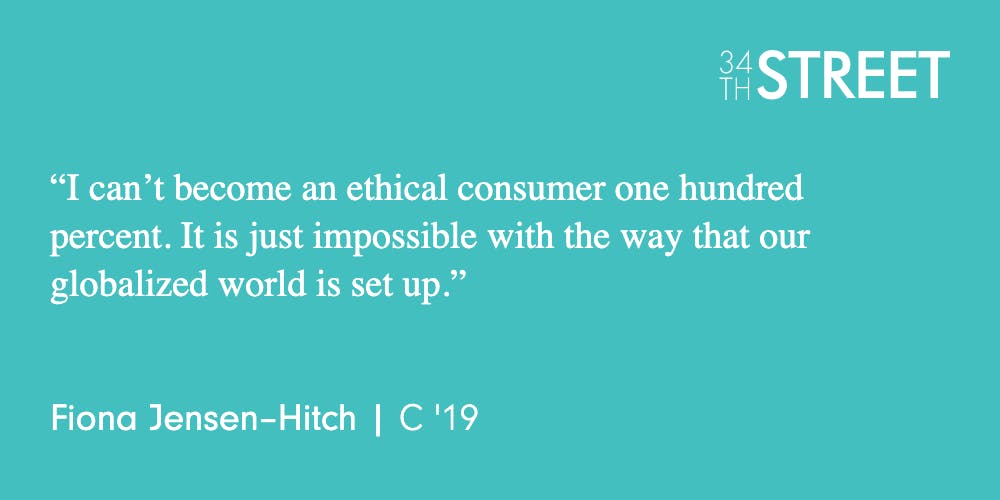Surrounded by friends in the chilly Pocono forests, José Maciel (N ‘19) put down his burger and opted for a salad instead. “The world is so big, but here I am eating the life of another being,” he contemplated.
The burger “was once a cow that was doing its thing,” and now it’s contributing negatively to “cardiovascular health and cholesterol lipids.” At that moment in November of 2016, José decided to adopt a plant–based diet.
José, a Nursing and Nutrition Science double major and avid runner, promotes healthy living. After losing his father to a heart attack during a car accident—he attributes his passing to health problems stemming from heavy meat consumption—José sought to eliminate animal products from his diet. A weightlifter, he went from regularly eating sandwiches with half or a whole pack of deli meat or seven chicken breasts at a time to a whole–food, plant–based lifestyle. José hopes to influence the rest of his family members to “adopt a healthier road” as well.
Though José avoids meat and dairy, he refers to his diet as “plant–based” rather than “vegan.”
“When you hear the word ‘veganism,’ to me what comes to mind is a bunch of people running into a steakhouse with signs and shaming people for eating their steak,” says José. “They don’t deserve that ... I don’t appreciate when people are doing loud, in your face, ‘you’re wrong, we’re right’ protests.”
Veganism—a lifestyle without the use or consumption of animal products—has become an increasingly popular movement in the United States. As of 2016, 9 percent of U.S. adults follow strictly or mostly vegan or vegetarian diets. In 2018, the sales of plant–based alternatives to conventional animal products grew 17 percent, as opposed to a mere 2 percent growth in overall U.S. food sales. Even in Philadelphia, some restaurants have taken to vegan menus, such as Honest Toms, and 2018 marked the inaugural Philly Vegan Restaurant Week.

As veganism becomes more mainstream, some people have accused the movement of being aggressive, exclusionary, and elitist. With graphic scenes of slaughterhouses and documentaries depicting underground footage from factory farms typically used as persuasion tactics, some feel that vegan movement promotes a judgment and disdain for meat–eaters. But many vegans at Penn are working to dispel these attitudes, advocating for healthy, ethical, and environmentally conscious dietary habits while remaining cognizant of accessibility.
“I definitely think that graphic footage has a place,” says Jake Welde (E ’19), who became a vegan during the spring of his freshman year at Penn. “Graphic footage is associated with vegans in some sense, but the graphic footage really belongs to non–vegans, who are creating demand for these products and causing them to be produced in this way.”
Even as a vegetarian, Jake had “a lot of stereotypical views about vegans being preachy and loud.”
“Veganism as a ‘brand’ or in the public consciousness has been so damaged by that advocacy,” Jake says. “There’s a stereotype of a preachy loud vegan. Most vegans I know, they might be quiet, but they are proud to be vegan because it’s something that they care a lot about.”
Many Penn students strive to debunk these stereotypes by fostering open dialogue about the lifestyle. They characterize veganism as accessible and inclusive and promote positive discourse about plant–based eating. For many, “going vegan” means advocating for animal rights, environmental sustainability, or dietary health benefits. Instead of scare tactics and grotesque images, students focus on the benefits—environmental, ethical, and nutritional—of plant–based lifestyles.
“I have nothing against meat–eaters,” José says. “Never will I food–shame or say that what you are eating is bad for you. I will say that there are better options to consider. I promote the eating of healthier foods.”

José is not alone. Perren Carrillo (C '19) a former copy editor for 34th Street, for instance, has been vegan since Aug. 2016 and focuses on being a role model for friends and family rather than engaging in activist groups.
“I understand why some vegans are very militant, but it is very alienating,” Perren says. “I believe in treating people who are not vegan with more compassion rather than criticizing them for eating meat. From what I see, there is more attacking than helping people to understand, which I don’t think helps anyone.”
Here on campus, Penn’s Vegan Society (PVS) brings attention to veganism by offering a space for conversation about the lifestyle, orchestrating educational talks with high–profile speakers, and hosting discussion–based events. PVS is a constituent of the Student Sustainability Association at Penn (SSAP) and consists of a general board that works to facilitate dialogue about veganism that intersects with other subjects like ecofeminism and food justice.
“One of the biggest problems I have with the mainstream veganism movement is that the activism is often engaged in this privileged way because it comes very much from the point of view that everyone is able to make this switch to veganism,” says outgoing co–chair of PVS Fiona Jensen–Hitch (C‘19). “You can’t make that assumption about anyone’s life without understanding what their position is first. At PVS, we try very hard to work outside of that dominant framework.”
PVS is a sponsor of “The Ivy League Future of Food Conference,” an annual conference on plant–based diets and bioethics. The 2018 conference was held at Penn on Oct. 12–14. Previously, the event was called “The Ivy League Vegan Conference.”
“We rebranded [the conference] because we didn’t want to exclude people who are not vegan,” says Bhairevi Aiyer, who received her Masters of Environmental Studies at Penn in 2018 and helped plan the conference. “There is no point in preaching to the choir. The point is to have a healthy discussion and to make the case from a business, science and health perspective.”
As the conference suggests, reasons for going vegan are rooted in concerns that range from ethics to personal health to the environment. Jake went vegan partly due to animal advocacy but also to act in alignment with his beliefs. “I don’t think there's a way to consume animal products ethically,” Jake continues, “because at the end of the day, as a unit of production, animals’ rights will never be respected.”
Similarly, Bhairevi felt compelled to remove dairy from her already–vegetarian diet after learning the role that agriculture plays in pollution. As an environmentalist, she felt “hypocritical to not make that change”, considering that animal farming takes up 83 percent of the world’s agricultural land.
Like Bhairevi, Fiona references environmentalism, rather than ethics, as her primary motivation to remove dairy from her then–vegetarian diet.
“It’s not that the ethics are not important to me—they are,” Fiona says. “I think because that has been the dominant angle within the word ‘vegan’ for a while. Personally, I don’t view it as the most useful way to get people to reduce meat consumption because a lot of it is centered on attacking people who do eat meat or who do consume animal products. It does not invite people to try something new.”

José, who cites health as his primary motivation, is also sympathetic to environmentalism and ethical views of animal abuse and agriculture.
“I don’t like talking about that [animal rights] because I don’t think its the driver that changes people’s views on veganism,” José says. “Ethical views are personal, but what you can’t deny is the science behind the health and environmental causes.”
While José chooses to call himself “plant–based,” other students who go by “vegan” worry about negative stereotypes. Apart from being pushy, Fiona says that vegans are also often perceived as elitist. Still, she doesn’t “believe that veganism at its core is an elite thing, it is practiced in privileged ways.”
Being vegan can actually be economical, but it takes knowing how to cook at home and how to select filling foods, according to José. When José chooses groceries, he buys per calorie and not per volume. Almost every day, he brings his favorite meal to class: a Japanese sweet potato. “You don’t need anything on it,” Jose continues, “for a potato, you need ketchup or hot sauce. For a yam, you need cinnamon or brown sugar. For a Japanese sweet potato, you can eat it on its own. For fifty cents, you can have a whole meal.”
Perren agrees that money is seldom the biggest obstacle to maintaining a vegan lifestyle. He explains that while vegan food in restaurants is sometimes unreasonably priced, cooking at home helps. Perren enjoys cooking for friends, making foods like babka and watermelon poké, to spark their interest in trying out a vegan diet.
Instead of focusing on the dietary restrictions that come with being vegan, many students call attention to the positive additions that come with instilling a plant–based diet.
“Everyone views being vegan as what you’re giving up,” Jake says. But he stresses that “there are a ton of different foods from different cultures or just from different places in the city that I hadn’t tried before I was vegan. I probably eat more interesting, healthier and varied foods now than before I became vegan.”
“Something people forget about vegans is that virtually every vegan used to not be a vegan,” says Jake. “Basically, every vegan at some point in their life looked at what they were doing and new information they found and was like ‘this is wrong, I want to change what I am doing’ or ‘I could be better if I changed what I am doing.’ People think of the preachy vegan as arrogant in a sense, but I think veganism takes a certain level of humility where you’re like ‘I’ve been doing something wrong my whole and I’m going to change that.’”
Fiona hopes to inspire others to consider participating in the movement. She wishes for people to start thinking critically about their diets, even if they don’t totally go vegan.
“For me, it is about trying to become conscious and aware of the fact that of course, I can’t become an ethical consumer one hundred percent,” Fiona says. “It is just impossible with the way that our globalized world is set up.” However, she encourages people to talk with others who are passionate about these issues to get a broader perspective on the movement as a whole.
José, too, recognizes that veganism is practical only for some people. Still, he promotes taking small steps that can slowly help improve the world around us.
“I don't think everyone can be vegan, at least not now,” he says. “I’m not about being one hundred percent. I’m about being ten percent or five percent better today, and let’s see where we get next week. Let’s see how we can keep improving.”
